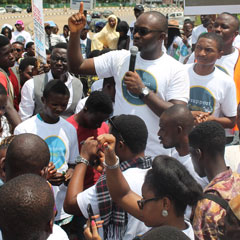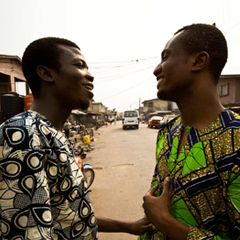
Evaluation Period: 2015 - 2019
Total Awarded: $66.8 million
Total Number of Grants: 138
Geographic Focus: Nigeria
Background
Since 2015, our On Nigeria Big Bet strategy has sought to reduce corruption by supporting Nigerian-led efforts that strengthen accountability, transparency, and participation. Our theory of change builds on Jonathan Fox’s “sandwich theory,” which leverages the interplay between a push from below, by which citizens demand change (“voice”), and pressure from above to encourage public and private institutions to develop and enforce laws and regulations (“teeth”). We know that corruption is complex and ever-evolving, and progress toward the goal of reducing it will most certainly not be linear nor simple. Thus, our On Nigeria strategy is multilayered, comprising five areas of targeted programming, or modules—the Home Grown School Feeding (HGSF) Program, the Universal Basic Education Commission (UBEC) Intervention Fund, Electricity Distribution, Criminal Justice, and Media and Journalism—and three cross-cutting areas—behavior and social norm change, civil society pressure for government accountability, and election-related efforts.
As of the posting of this report, 138 grants (totaling $66.8 million) have been made through the On Nigeria strategy and that represent a proving ground for developing and testing a range of tactics and entry points for combatting corruption.
What We Evaluated
In 2016, we commissioned EnCompass LLC to serve as the Evaluation and Learning Partner for the On Nigeria strategy. This report synthesizes information on the strategy collected and analyzed by EnCompass through 2019 to help us answer three overarching questions:
- Does progress to date demonstrate momentum and provide a line of sight to significant, meaningful, and sustainable long-term outcomes and impact?
- Is the theory of change valid and adequate to reach the intended impacts?
- Does the landscape suggest continued windows of opportunity for progress toward On Nigeria’s intended outcomes and impacts?
It builds on EnCompass’ initial evaluation report for On Nigeria published in 2018 and is being used to inform ongoing learning and decision making about the strategy.
What We Learned
- Evidence on the strategy’s progress to date shows that there is a clear line of sight to long-term outcomes and impacts for the Criminal Justice module; a potential line of sight for the HGSF, Media and Journalism, and the strategy overall; and still an inadequate line of sight for the UBEC and Electricity modules. Many of the short-term milestones the On Nigeria team identified as important to demonstrating the viability of the strategy in the long term have been reached, particularly for Criminal Justice, Media and Journalism, and the HGSF modules. The Electricity and the UBEC modules have had less success in achieving their milestones, largely due to contextual factors external to the work of the grantees. Grantmaking for most cross-cutting areas of the strategy was initiated only in 2018, so these areas are still too early in implementation to adequately assess progress or line of sight.
- Findings about On Nigeria’s theory of change indicate that the strength of the theory of change is its multifaceted nature, which aligns with the multidimensional nature of corruption. Evidence shows that On Nigeria’s theory of change—based on its articulation of the sandwich theory—is a valid approach for confronting corruption in Nigeria, joining the push from below (“voice”) with the squeeze from above (“teeth”). Sustainable long-term change will depend on the interplay of “voice” and “teeth,” and signs of this change have emerged in the HGSF, UBEC, and Media and Journalism modules. However, the theory of change itself has gaps in the areas of spread needed for change at a larger scale, the role of norms for those who work in the system, and the link between anticorruption work and better governance.
- Information collected on the status of windows of opportunity in the strategy’s landscape shows that the window of opportunity is still open—and perhaps even more open for our investment. However, there has been some evolution in the landscape since 2015, and evidence suggests new risks to the windows of opportunity in the future. Two primary risks are already evident: (1) government efforts to close the civil society and media space could impede “voice” actors’ and grantees’ ability to act; and (2) the 2023 elections, with their inherent political maneuvering, will influence government and other actors, and a new administration could be hostile to the anticorruption agenda. If the coalition of anticorruption reformers continues to grow, the window for effecting change could open even wider, with additional partners to work with. On the other hand, if the government pursues actions that further tighten the civil society and media spaces, the window of opportunity could close rapidly.
Annex 4: On Nigeria Evaluation and Learning Framework ›
Annex 5: Data Collection Instruments ›
MacArthur's evaluation philosophy ›



